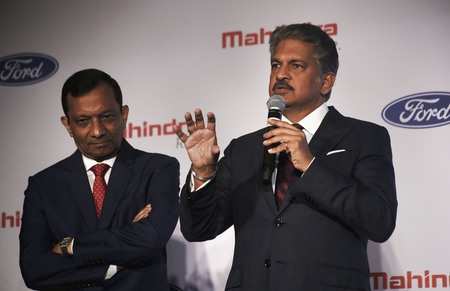 Mumbai: The much awaited joint venture between Mahindra & Mahindra and Ford Motor Company has been called off due to significant changes in the global business environment due to Covid-19 pandemic. The decision follows the passing of the Dec. 31 “longstop,” or expiration, date of a definitive agreement the organizations entered into in October 2019.
Mumbai: The much awaited joint venture between Mahindra & Mahindra and Ford Motor Company has been called off due to significant changes in the global business environment due to Covid-19 pandemic. The decision follows the passing of the Dec. 31 “longstop,” or expiration, date of a definitive agreement the organizations entered into in October 2019.Ford in its official statement in the US said its independent operations in India will continue as is.
The US car maker will continue with its joint projects, with Mahindra & Mahindra expected to produce the cars for Ford through contract manufacturing tie-up.
Ford Motor and Mahindra & Mahindra have mutually and amicably determined they will not complete a previously announced automotive joint venture between their respective companies, said the statement from the company.
According to the companies, the outcome was driven by fundamental changes in global economic and business conditions – caused, in part, by the global pandemic – over the past 15 months. Those changes influenced separate decisions by Ford and Mahindra to reassess their respective capital allocation priorities.
In a statement to Bombay Stock Exchange, Mahindra & Mahindra said “this decision will not have any impact on its product plan. It is well positioned in its core true SUV DNA and product platforms with a strong focus on financial performance. In addition, Mahindra is accelerating its efforts to establish leadership in electric SUVs.”
The proposed 51:49 joint venture which had already received clearance from Competition Commission of India was awaiting clearance from the local state governments of Gujarat and Tamil Nadu – but the same was delayed on account of Covid-19.
Ford Motor is actively evaluating its businesses around the world, including in India, making choices and allocating capital in ways that advance Ford’s plan to achieve an 8% company adjusted EBIT margin and generate consistently strong adjusted free cash flow.
The company has set its sight on developing and delivering high-quality, high-value, connected vehicles – increasingly electric vehicles – and services that are affordable to an even broader range of customers and profitable for Ford.
Ford says it is moving quickly to turn around its automotive business – competing like a challenger while simplifying and modernizing all aspects of the company, and grow by capitalizing on existing strengths, disrupting the conventional automotive business, and partnering with others to gain expertise and efficiency.
Mahindra & Mahindra along with Ford Motor Company Inc., USA (“FMC”) had executed in October, 2019 a business transfer agreement and share subscription agreement to enable the formation of a joint venture by way of the company and/ or its subsidiaries acquiring 51% of the equity share capital of Ardour Automotive Private Limited, a wholly-owned subsidiary of Ford Motor Company (“NewCo”) in India.
The balance 49% equity shareholding in NewCo was to be held by FMC and/or any of its affiliates; New Co was to acquire the automotive business of Ford India Private Limited (“FIPL”), a wholly-owned subsidiary of Ford Motor Company.
Upon completion of the aforesaid business transfer, the agreements contemplated the execution of a JV agreement and other ancillary documents between the company and/or its subsidiaries and FMC and/ or any of its affiliates.
The new company was to purchase most of the automotive assets of Ford India Private Limited (FIPL), including two vehicle manufacturing plants but excluding one engine making plant in Sanand, Gujarat. The enterprise value of those assets was pegged at Rs 1,925 crores.
After adjusting for FIPL’s debt of Rs 636 crore, which the new company will assume, Ford and Mahindra was to pay the remaining Rs 1,289 crore in cash. Mahindra will pay 51% of this, which comes to Rs 657 crore and Ford will foot the remaining capital in the new entity.
Mahindra and Ford have been in talks for over three years now and have previously signed several agreements, including ones to co-develop an SUV and connected vehicles technology, and sharing engines.
The agreements to share BS VI petrol engines and C segment SUV have already been formalized. The project W605 – C SUV for Ford based on the new generation Mahindra XUV platform has already been kicked off and is likely to hit the roads by end of 2022 and both Mahindra and Ford have actively negotiated the joint B SUV project called B772 including an electric vehicle.














